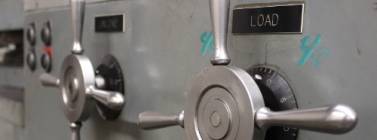Is rotational capacity testing required for A325 bolts?
Rotational capacity testing is a test “intended to evaluate the presence of lubricant, the efficiency of lubricant, and the compatibility of assemblies.” The test is intended primarily for galvanized fasteners and fasteners that must be fully tensioned in structural applications.
With A325 bolts now falling under the new F3125 specification, which covers high strength structural bolts, there has been some confusion with regards to the rotational capacity testing requirements. When F3125 was first written in 2015, all rotational capacity testing was a supplementary requirement (S4), which stated “When specified on the inquiry and order, rotational capacity testing in accordance with Annex A2 shall be performed by the responsible party.”. With the 2019 revision, rotational capacity testing for galvanized assemblies has been moved back to required testing. Plain finish and alternate coating assemblies are supplementals and can be tested under supplementary requirement S4.
Portland Bolt is able to perform rotational capacity testing in the testing lab in our facility.




what is Annex A2
or what is the Annex A2 requirement?
@Suzanne- Annex A2 explains the rotational capacity procedure and lays out the tension/torque values.
F3125 Table 3 Note A states “Galvanized assemblies shall be rotational capacity tested by the responsible party.” and then states that other-than-galvanized assemblies “…shall be rotational capacity tested… when specified…”.
As you mentioned, F3125 Annex 2 states “This test is intended primarily for galvanized fasteners, and fasteners that must be fully tensioned in structural applications.”
This seems to leave a gray area between Table 3 and Annex 2, i.e. what about non-galvanized assemblies which are specified as being fully tensioned in structural applications but not otherwise specified as requiring ROCAP testing? Does specifying that they be fully tensioned constitute a de facto requirement that they be ROCAP tested?
James- We think that what the standard is saying is that galvanized assemblies must be tested, and plain (or other coated) assemblies should be tested when they are to be fully tensioned, i.e. slip critical applications.So if the plain bolts are used in snug tight or non-critical applications, it is not required. Rocap testing in general is a supplemental requirement only, meaning that it is only performed when requested. However we can concede that the wording in table 3 regarding that is not clear.